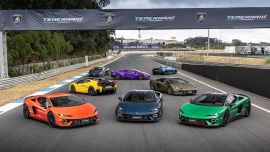Mercosur, the regional bloc founded in 1991 by Argentina, Brazil, Paraguay and Uruguay, turned 30 yesterday, weakened by differences between its partners and wrong-footed by the coronavirus pandemic.
Although born in Asunción to create a common market to boost trade by enabling its partners to negotiate as a bloc, to date Mercosur has not succeeded in reaching important agreements with the world’s major consumer markets.
The agreement so laboriously negotiated with the European Union over more than two decades is now stalled due the questions raised by Jair Bolsonaro’s lack of any environmental policy with runaway deforestation in Brazil, while European farmers are reticent about facing up to the far more competitive agriculture of Mercosur.
The common external tariff is riddled with exceptions to the point that one of the signatories of the Treaty of Asunción, Uruguayan ex-president Luis Alberto Lacalle Herrera (father of the current president), told AFP that Mercosur "was never set up."
Post-pandemic world
Is Mercosur ready for the post-pandemic world?
"Definitively not," replies Ignacio Bartesaghi, director of the International Business Institute of the Catholic University of Uruguay. "Today Mercosur is leaderless without dialogue between its two main economies," i.e. Brazil and Argentina.
A post-pandemic world will need to "reconnect with the United States and China" whereas Mercosur has not even reached "any basic consensus," points out Bartesaghi.
"The pandemic has been no exception. There were no joint purchases of vaccines. (...) nor common criteria as to how to face it," he gives as examples.
Brazil’s Thomaz Favaro, director of Control Risks consultants for Brazil and the Southern Cone, agrees: "Mercosur is not ready for the post-pandemic world. It has yet to resolve the primordial question of what it is to serve as a vehicle for economic integration and it’s not going to resolve it any time soon." He added: "It’s hardly feasible to imagine the bloc with a common negotiating position in the near future."
"Mercosur was never a bloc with any level of cohesion or any minimal consensus as to how it could discuss the major issues of the global agenda," concludes Bartesaghi.
According to the analysts, the lack of a "supranational organisation" which make integration above and beyond national interests possible, as happened in Europe, and the inability to yield sovereignty to the bloc’s benefit explain the lack of advances.
Delayed EU agreement
In 2019, Mercosur, with a combined gross product of US$2.4 trillion, and the EU, with almost US$14 trillion, announced a landmark commercial agreement after two decades of conversations. However, the pact still awaits parliamentary approval.
Nevertheless, what was then seen as a success is threatened today by the advance of deforestation in Brazil.
The tension between Mercosur’s largest economy with 212 million inhabitants and the EU reached the level of paroxysm last January when Bolsonaro accused his French counterpart Emmanuel Macron of talking "nonsense" when he affirmed that Europe’s dependence on Brazilian soy sustains the deforestation of the Amazon.
"When we import soy hastily grown in the devastated jungles of Brazil, we are not being consistent with ourselves," said Macron.
But Brazilian Vice-President Hamilton Mourão, retorted that those statements reflected "the protectionist interests of French farmers."
"The more protectionist countries, or those most contrary to advancing over agricultural issues, find the environment very convenient for blocking [the agreement]. But that does not mean that the environmental issue is not" present in European sensitivities, argues Bartesaghi.
The deal "will be sealed sooner or later," predicts the expert. "Bolsonaro, or whoever comes next, will have to take on additional commitments over environmental issues.”
Favaro does not expect any advances in the short term with the EU, and not just because of the Amazon.
"Deforestation perhaps stands out. But there are other concerns such as the Bolsonaro government’s lack of appreciation for multilateral organisations and a possible erosion of democracy in the country, all contributing to the agreement not advancing in the short term."
The future
Emerging from an integrationist vision in a world of trade blocs, Mercosur initially permitted a halt to the rivalries between Argentina and Brazil, and the negotiations with their partners towards a common external tariff reduced the protectionism of the two major regional economies. The circulation of workers between the countries improved while some sectors gained benefits from greater facilities to export and import.
Three decades later, without any major common achievements ("They practically found no commercial partners willing to converse," observes Favaro), for some of the members, with Uruguay at the head backed by Paraguay, "flexibility" is the main issue on the table.
That "flexibility" is nothing less than freeing Mercosur partners to seek bilateral trade agreements without the approval of the others, something currently restricted and which the four presidents had to tackle at yesterday’s summit in virtual format (something as lacklustre as Mercosur itself), as forced on them by the pandemic.
An uncertain future lies ahead.
related news
by Mauricio Rabuffetti & Jordi Miró, AFP


























Comments